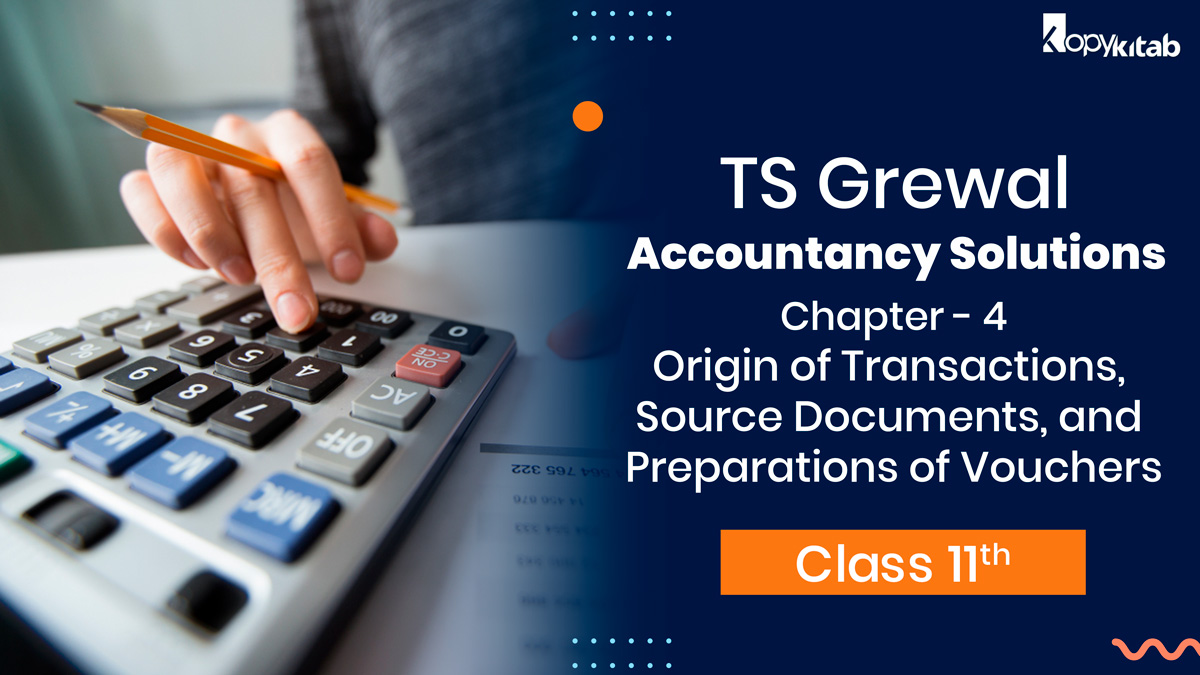
TS Grewal Class 11 Accountancy Solutions Chapter 4 – Origin of Transactions, Source Documents, and Preparations of Vouchers, has explained the concepts of the chapter in a detailed manner to prepare the students for their upcoming exams.
The concept of Source Documents and Preparations of Vouchers is a fundamental concept for the students and TS Grewal can help out students in that.
- Read More: TS Grewal Class 11 Solutions
Download PDF TS Grewal Class 11 Accountancy Solutions Chapter 4
As mentioned above, the concept of Origin of Transactions, Source Documents, and Preparations of Vouchers are really important for the Class 11th Students. Simple and step-by-step solutions for this chapter are given in the TS Grewal Accountancy Solutions.
TS Grewal Class 11 Accountancy Solutions Chapter 4
Detailed TS Grewal Class 11 Accountancy Solutions Chapter 4
Source Documents and Preparations of Vouchers is a scoring topic and students should have the proper knowledge of it. TS Grewal Class 11 Accountancy Solutions has given step-by-step solutions to the students to cease the chances of error as much as possible.
All the theoretical and practical concepts have been explained with precision. For Accountancy, many illustrations have been made in TS Grewal. The main concepts explained in this chapter are Depreciation, Bank Reconciliation Statement (BRS), and Trial Balance.
Revenue expenditure and Capital has been explained in detail, in TS Grewal Class 11 Accountancy Solutions, Chapter 4.
Revenue expenditure is defined as a part of Government expenditure but does not take part in the acquisition of assets. Revenue is calculated based on expenditure in the current year.
While Capital is defined as the money used or spent in the development of fixed assets, such as machinery, buildings, etc.
In Chapter 4, TS Grewal Class 11 Accountancy Solutions, a distinction has been made between capital expenditure and revenue.
|
Capital Expenditure |
Revenue |
|
The expenditure used for developing assets over a period is known as Capital Expenditure. |
The expenditure made for daily operations is known as revenue. |
|
Capital Expenditure can also be known as total cash incurred on assets. |
Revenue can also be known as something that does not reflect on a balance sheet. |
|
It is implemented by the company. |
It is done for prospering present earnings. |
- These topics are really important for students from an exam point of view. TS Grewal has given detailed explanations on every topic.
- All the given solutions are solved in a way that is easy for the students to understand and remember.
- All the Class 11th students can rely on this book for exam preparation as well as their homework.
For further queries regarding the CBSE TS Grewal Class 11 Accountancy Solutions Chapter 4 – Origin of Transactions, Source Documents, and Preparations of Vouchers, you can ask in the comment box.
FAQs – TS Grewal Class 11 Accountancy Solutions Chapter 4 – Origin of Transactions, Source Documents, and Preparations of Vouchers
What is the meaning of the term Revenue?
Revenue expenditure is defined as a part of Government expenditure but does not take part in the acquisition of assets. Revenue is calculated based on expenditure in the current year.
What is the meaning of the term Capital?
Capital is defined as the money used or spent in the development of fixed assets, such as machinery, buildings, etc.
What are the types of vouchers prepared in a business firm?
The following types of vouchers are prepared in a business firm:
Purchase voucher
Sales voucher
Cash payment voucher
Cash Receipt voucher
Bank payment or Cheque payment voucher
Bank Receipt or Cheque Receipt voucher
Journal voucher
Sales Return voucher
Purchase Return voucher
Contra voucher
